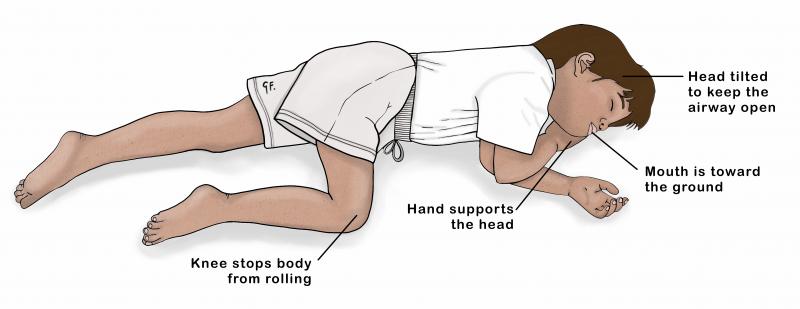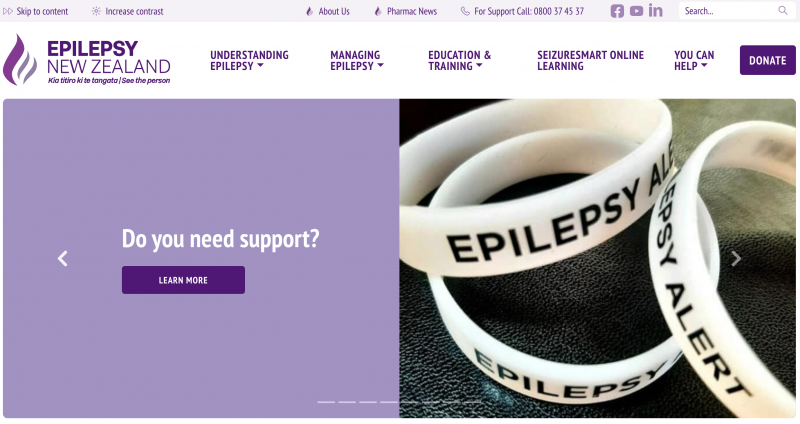Epilepsy In Children
Epilepsy In Children
Epilepsy is the name of a group of disorders. Tamariki (children) with epilepsy have epileptic seizures. But not all children with epileptic seizures have epilepsy.
Key points about epilepsy in children
- an epileptic seizure happens when your child's brain has abnormal electrical activity
- epileptic seizures can include unusual movements, behaviour or funny feelings
- although seizures can be frightening and awful to watch, most stop on their own
- when tamariki have more than one epileptic seizure, this may result in a diagnosis of epilepsy
What is epilepsy?
Epilepsy is the name of a group of disorders. Tamariki with epilepsy have epileptic seizures.
Epilepsy is quite common. It affects 1 in every 200 tamariki.
Anti-seizure medicines are usually very effective in controlling seizures.
What are epileptic seizures?
Our brains think and control our bodies using electrical messages. An epileptic seizure happens when there is abnormal electrical activity in your child's brain. This can cause unusual movements, behaviour or funny feelings. Normal brain function cannot continue until this abnormal electrical activity stops.
What are the different types of seizures?
Some seizures can be quite subtle. For example, a seizure may involve only blank staring for a few seconds. Seizures can also sometimes be quite bizarre and tamariki can have quite inappropriate behaviour or feel very scared. Other seizures have obvious movement changes where one part or the whole body can go stiff and/or jerk quite violently.
Focal Seizures
Sometimes the abnormal electrical activity starts only in certain areas of the brain, which is why only certain body parts may twitch or shake. These types of seizures are called focal seizures.
Generalised Seizures
When the start of the abnormal electrical activity involves the whole brain these seizures are called generalised seizures.
Read more about the types of epileptic seizures
Will my child get any warning before a seizure?
Some older tamariki may experience an unusual feeling called an 'aura' which is the start of a focal epileptic seizure. This feeling may be a funny smell, a headache, a taste in their mouth or a stomach pain. If they have an 'aura' at the beginning of their seizures they may have time to tell you how they feel. Or, they may be able to lie on the floor so they are less likely to injure themselves.
Seizures can be frightening but remember they will stop
It may seem like the epileptic seizure goes on forever but most epileptic seizures last less than 5 minutes. Although they can be very frightening and awful to watch, epileptic seizures that last less than 5 minutes do not cause any damage to the brain.
What can trigger an epileptic seizure?
Things that can increase the chance of an epileptic seizure include:
- tiredness
- illness
- fever
- stress
- excitement
Flashing lights or deep breathing that can trigger an epileptic seizure in some types of epilepsy. These are not triggers for all tamariki with epilepsy.
Can my child's seizure type change?
Even though your child experiences their own particular kind of seizure, seizure types can change from time to time. So it is important that you know what to do if a major seizure should ever happen.
Why does my child have epilepsy?
The most common cause of epilepsy is genetic. The genetic abnormality that causes epilepsy in your child may be an inherited genetic change and other members of the family may also have epilepsy. Or, it may be a genetic change only in your child with epilepsy.
Epilepsy can also happen when there is an injury to the brain cells such as:
- a severe head injury
- a brain infection like meningitis
- an infection during pregnancy which has affected the growing brain
When should I seek help for my child with epilepsy?
Check advice about what to do when your child has a seizure
Will my child need tests and investigations after an epileptic seizure?
If your doctor thinks your child has had an epileptic seizure, they will contact the paediatric (children’s health) department at your local hospital. The hospital doctor who sees your child may arrange some tests.
EEG (electroencephalogram)
If your child has had an epileptic seizure they may need an EEG. An EEG is a recording of their brain's electrical activity. Your child can have an EEG as an outpatient. They don't need to stay in hospital.
MRI (magnetic resonance imaging)
Your child may also need an MRI scan to look at the structure of the brain. Whether your child needs an MRI will depend on the type of seizure they have and the results of the EEG.
Read more about MRIs of the brain
Will my child need to take medicine for epilepsy?
Most tamariki need anti-seizure medicine if they’ve had 2 seizures. This is to help prevent further seizures. The specialists will talk about the options with you.
There are many different kinds of anti-seizure medicines for tamariki with seizures. Each one works differently to prevent seizures.
Read about anti-seizure medicines
Will my child need rescue medicine for epileptic seizures?
If your child has had an epileptic seizure that lasted for more than 5 minutes, your doctor may prescribe medicine to stop a long seizure. This is called emergency epileptic seizure medicine or seizure rescue medicine and comes in 2 forms.
Midazolam
You can give midazolam either in between the teeth and cheek (buccal) or in the nose (intranasal)
See the KidsHealth page on midazolam.
Diazepam (Stesolid)
You can give diazepam to your child in their bottom (rectal).
See the KidsHealth page on diazepam.
Call an ambulance after giving seizure rescue medicine
After you have given the medicine, call an ambulance unless otherwise instructed by your doctor.
While you are waiting for the ambulance, continue to lie your child on their side in the recovery position and stay with them.
The below illustration shows a child in the recovery position.

You may need to teach other people who care for your child how to use this medicine. This might include your child's teacher.
See the KidsHealth page on emergency epileptic seizure medicine to learn more
See the KidsHealth page on seizure first aid to learn more
What is status epilepticus?
Status epilepticus is the name for seizures that go on for a long time:
- 5 minutes or more for convulsive seizures
- 10 to 15 minutes or more for non-convulsive seizures
Very long seizures can be bad for the brain. It is unclear exactly how long a seizure needs to be to cause damage. It is likely to be 60 minutes or more for convulsive seizures and longer than that for non-convulsive seizures.
Call an ambulance if your child's epileptic seizure lasts for more than 5 minutes. Your child can receive further treatment in hospital.
If your doctor has prescribed rescue medicine use it as instructed by your doctor. This will usually be for any seizure that lasts for more than 5 minutes.
After you have given the medicine, call an ambulance. While you are waiting for the ambulance, continue to lie your child on their side in the recovery position and stay with them.
Most tamariki will not experience 'status'. It is not clear why some tamariki get status epilepticus. It depends on the type of epileptic seizure, how well medicine controls their seizures and the reason for their epilepsy.
Can my child die from epilepsy?
Sudden unexplained death in epilepsy (SUDEP) is a very rare but sad event. In any 1 year, it affects 1 in 4,500 tamariki with epilepsy. In other words, every year, 4,499 of 4,500 tamariki will not die from epilepsy. The best way to prevent SUDEP is to stop convulsive seizures and this is one of the reasons your doctor may recommend anti-seizure medicine for your child.
Call Epilepsy New Zealand for support - 0800 37 45 37.
What about safety for my child with epilepsy?
Your child's healthcare team will give you advice about increasing safety for your child with epilepsy. The advice will depend on the type and frequency of your child's seizures.
Read about safety for children with epilepsy
Who can I contact for more information about epilepsy or for help?
Epilepsy New Zealand
Epilepsy New Zealand has educators who can answer any questions you may have and can act as a support person for you. You can contact your local educator at 0800 37 45 37.
This page last reviewed 18 April 2024.
Do you have any feedback for KidsHealth?
If you have any feedback about the KidsHealth website, or have a suggestion for new content, please get in touch with us.
Email us now
